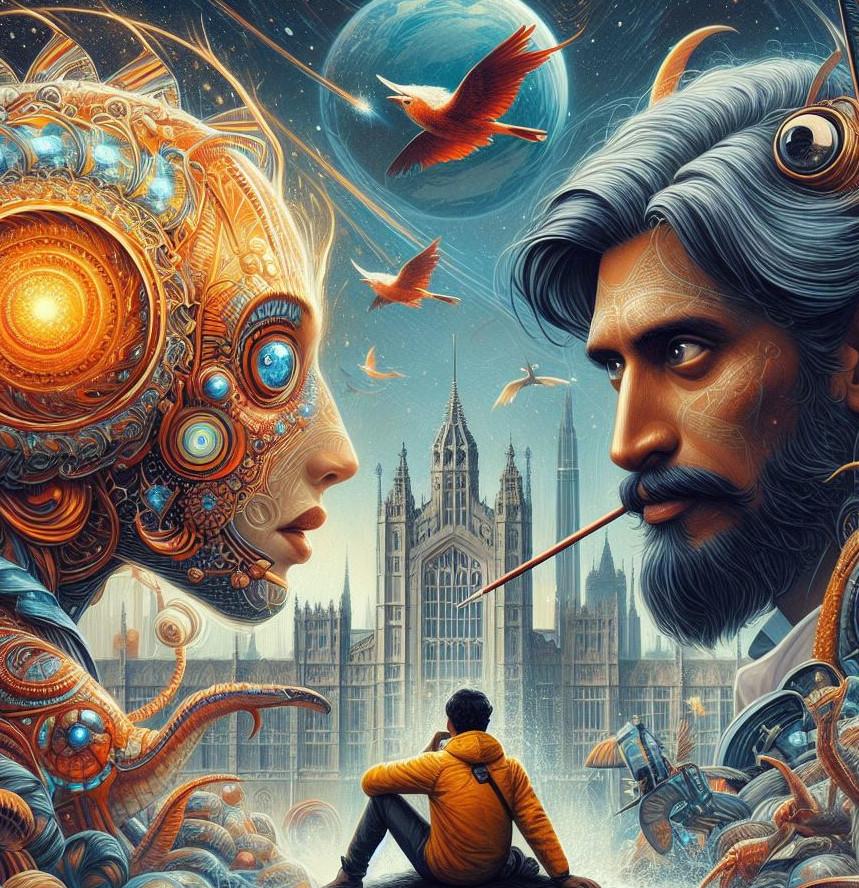“Defeat, when it came, was like a pall of smoke hanging over our heads, lowering our horizons,” Yeltsin said, sitting back in his chair, one boot on the boxwood table in the centre of the otherwise empty room. He lit a cigarette and took a deep draught, the livid scar near his mouth pinching into a white line as he inhaled. “That’s why we did the things we did. You would too. Anyone would.”
“You think we are not so different?” Major Rostowski said, his voice lowered, almost to inaudibility. He wondered if he would have done the same. A chill ran down his neck and he shucked up the collar of his shirt, an action prompting Yeltsin to smile.
“Yeah, yeah, see. You know,” Yeltsin insisted. He lowered his foot, leaned forward, and drew a circle with his finger in the dust on the tabletop. “The Zjheeks had us surrounded, or at least, what was left of us. The 25th, I mean. It would have been a turkey shoot if we hadn’t surrendered.”
“How many?” Rostowski whispered. He tried to picture the scene, but all he got were the screams. He leaned forward until he could feel Yeltsin’s breath on his face. “How many, corporal?”
“I dunno, major,” Yeltsin sat back in his chair and took another long drag on his cigarette. He threw his head back and blew the smoke high into the air. Then, without looking at his interrogator, he said, “Perhaps twenty-five. Probably less.”
“Then what happened?”
“One of the Zjheeks came down the slope,” Yeltsin said. He lowered his eyes from the ceiling and looked at Rostowski. “Man, those fricknahs are ugly. It was carrying one of those translator boxes.”
“What did it say?”
“It told us to take our clothes off, and throw them in a pile with our weapons,” Yeltsin said. The major took up his gaze. Rostowski had the kind of eyes men refuse to scrutinise; cruel and vacant, with just enough anger held at bay to worry you. “Tom, Private Allen, refused and started shouting. So, they lasered him. Clean through the forehead. No warning, no appeal to his better nature. Just blam, and he was gone.”
“So, what did you do?”
“The sensible thing,” Yeltsin grinned, just for a moment, but then saw Rostowski’s eyes again and it faded. “I stripped off. I ain’t got nothing to hide, not from those Zjheek bastards, anyways.”
“Then what happened?”
“The big Zjheek carrying the translator box climbs halfway up the slope and throws his sword, the big, curved thing they carry on their backs, into the ground about three feet from me,” Yeltsin spread his hands as a demonstration of the size. “Then all the rest do the same. He looks at me and says, only one gets out. So, I dive for his sword.”
“Then you all started fighting?”
“Yeah, no-one hesitated. We’d all heard about these gladiator contests. It’s kill or be killed,” Yeltsin said. He shrugged and stubbed out his cigarette on the table.
“Your own men?”
“Yeah,” Yeltsin said. “Captain Wright was the last one. He came at me like a banshee. Fought like a demon too, for a … well, you know.”
“But you overpowered and killed him? Then what?
“The Zjheeks started that rattling noise, like they were applauding. Then the one with the translator says to me, now you feast, and points at the captain, who was still dying,” Yeltsin paused, like he did not want to remember what happened next. “And one of the Zjheeks lasers his leg off. The captain screams like a madman and tries to get up, but they lasered his other leg off.”
“So, you ate one of his legs?”
“Both of them,” Yeltsin said. “Took me about three hours. I kept throwing up, and they kept doing the rattling, but eventually I finished. And then they were gone.”
“So, what did you do after they’d gone?”
Yeltsin lit another cigarette and took two drags on it before answering. “I got dressed and ran until I found the patrol. And they brought me here.”
“Do you know anything about Captain Wright? The man you ate?”
“Nothing really,” Yeltsin admitted. “Like, he was a good commander, but I knew nothing about him as a person. There were rumours about his preferences, if you know what I mean. He didn’t like girls. But that was okay with me.”
Rostowski stood and fixed Yeltsin with a glare. He said, “Captain Paul Wright was born in Tucksville, Ohio, in 2234. Wright attended Tucksville High, where he graduated with a football scholarship to Ohio State University, where he studied law and economics, graduating summa cum laude. When hostilities broke out with the Zjheeks, he joined the Terran Marines and was three weeks away from an honourable discharge when he was captured and killed. We were to be married when we returned to Earth.”
“Look,” Yeltsin stammered. “I had no choice, man. It was me or him.”
“It should have been him,” Rostowski said quietly, and drew his sidearm.

Be First to Comment